English USA Lesson 15 Talking About Part-time Jobs
新概念英语第二册第十五课课件Lesson15_good_news

He is nervous.
• nervous ['nə:vəs] adj. 精神紧张 的 神经
• nerve [nə:v] n. 神经 • 短语:
• be nervous about • 对…. 感到紧张
• Eg: Are you nervous about the English exam?
直接引语(变化前) 现在进行时
间接引语(变化后) 过去进行时
“I’m making coffee for you all,” she She said she was making coffee
said.
for us all.
Grammer - 2 直接引语转换间接引语
2.6 转换中的要点总结2-时态的转换3
Grammer - 2 直接引语转换间接引语
转换中的要点总结2-时态的转换1
直接引语(变化前) 一般现在时
间接引语(变化后) 一般过去时
“I know it,” he said.
He said that he knew it.
Grammer - 2 直接引语转换间接引语
2.6 转换中的要点总结2-时态的转换2
He said, “I have been doing it for hours.”
He said he had been doing it for hours.
Grammer - 2 直接引语转换间接引语
2.6 转换中的要点总结2-时态的转换7
直接引语(变化前) 过去完成时
间接引语(变化后) 过去完成时
Eg:He interrupted me while I was speaking. Eg:You interrupted my thoughts.
新概念英语第二册第15课

新概念英语第二册第15课第一篇:新概念英语第二册第15课Lesson 15 Good news 佳音The secretary told me that Mr.Harmsworth would see me.I felt very nervous when I went into his office.He did not look up from his desk when I entered.After I had sat down, he said that business was very bad.He told me that the firm could not afford to pay such large salaries.Twenty people had already left.I knew that my turn had come.'Mr.Harmsworth,' I said in a weak voice.'Don't interrupt,' he said.Then he smiled and told me I would receive an extra thousand pounds a year!New words and expressions 生词和短语secretary n.秘书nervous adj.精神紧张的afford v.负担得起weak adj.弱的 interrupt v.插话,打断参考译文秘书告诉我说哈姆斯沃斯先生要见我。
我走进他的办公室,感到非常紧张。
我进去的时候,他连头也没抬。
待我坐下后,他说生意非常不景气。
他还告诉我,公司支付不起这么庞大的工资开支,有20个人已经离去。
我知道这次该轮到我了。
“哈姆斯沃斯先生,”我无力地说。
“不要打断我的话,”他说。
然后他微笑了一下告诉我说,我每年将得到1,000 英镑的额外收入。
英语中级听力lesson15
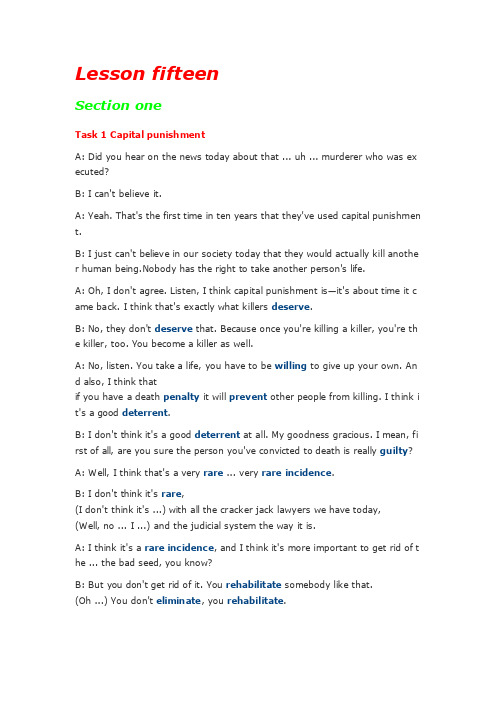
Lesson fifteenSection oneTask 1 Capital punishmentA: Did you hear on the news today about that ... uh ... murderer who was ex ecuted?B: I can't believe it.A: Yeah. That's the first time in ten years that they've used capital punishmen t.B: I just can't believe in our society today that they would actually kill anothe r human being.Nobody has the right to take another person's life.A: Oh, I don't agree. Listen, I think capital punishment is—it's about time it c ame back. I think that's exactly what killers deserve.B: No, they don't deserve that. Because once you're killing a killer, you're th e killer, too. You become a killer as well.A: No, listen. You take a life, you have to be willing to give up your own. An d also, I think thatif you have a death penalty it will prevent other people from killing. I think i t's a good deterrent.B: I don't think it's a good deterrent at all. My goodness gracious. I mean, fi rst of all, are you sure the person you've convicted to death is really guilty?A: Well, I think that's a very rare ... very rare incidence.B: I don't think it's rare,(I don't think it's ...) with all the cracker jack lawyers we have today, (Well, no ... I ...) and the judicial system the way it is.A: I think it's a rare incidence, and I think it's more important to get rid of t he ... the bad seed, you know?B: But you don't get rid of it. You rehabilitate somebody like that.(Oh ...) You don't eliminate, you rehabilitate.A: Listen, studies show that criminals are never really rehabilitated. When the y're ... when theycome out of prison they just go back to a life of crime, and they're hardened by that crime.B: Because the rehabilitation process has to be more than just what's in jail . I mean,(Oh ...well.) when you're in jail you do have to work, but when you're out of jail there has to be anextensive program. We have to expand on the idea till it works.A: I don't agree. Listen—and, anyway, the jails and the prisons are already ve ry crowded, andwe have to pay, the taxpayers. Our money goes to maintaining murderers' (I ...) lives.B: I agree with you. That's why it's important to look at the problem on a mu ch larger scale.The real problem is a social problem.(What ... no ...) There are other problems that causepeople to kill. Look at poverty, drugs, discrimination.A: Some people are just bad. They're just evil and there's nothing you can do .B: No, there ... it is ... no, it isn't true. There's rehabilitation.(No.) And they ... we're allit ... for ... to humanity. That's one of the reasons ...A: Well, but in the meantime you have to take care of the people who have al ready committed...B: I agree with you there.A: Preventative is different, but ...B: I agree with you there.Task 2 A new way of lifeAnnouncer: On 'TV Magazine' tonight we're looking at people who have given up regular jobs andhigh salaries to start a new way of life. First of all, we have two interviewswit h people who decided to leave the 'rat race'. Nicola Burgess spoke to them.Nicola: This is the Isle of Skye. Behind me you can see the croft belonging to Daniel and MichelleBurns, who gave up their jobs to come to this remote area of Scotland. Dani el was the salesmanager of Hi-Vita, the breakfast cereal company, and Michelle was a succes sful advertisingexecutive. Michelle, can you tell us what made you give up everything to co me here?Michelle: Everything? That's a matter of opinion. A big house and two cars isn 't everything! Danand I both used to work long hours. We had to leave so early in the morning and we camehome so late at night, that we hardly ever saw each other. We should have co me here yearsago, but we were earning such big salaries that we were afraid to leave our jo bs. In the end wehad so little time together that our marriage was breaking up. So two years a go, we took aweek's holiday in the Scottish Highlands. We saw this place and we both fell i n love with it. Itwas for sale, and we liked it so much that we decided to give up our jobs, and here we are!Nicola: How do you earn a living? If you don't mind me asking.Michelle: We don't need very much. We keep sheep and goats, grow our own vegetables. We'vegot a few chickens. It's a very simple life, and we're not in it for profit. We're still so busy thatwe work from five in the morning until eight at night, but we're together. We' re happier than we're ever been and we're leading a natural life.Nicola: There must be some things you miss, surely.Michelle: I don't know. We knew such a lot of people in London, but they wer en't real friends.We see our neighbours occasionally and there's such a lot t o do on the farm that we don'thave time to feel lonely. At least we see each other now.Nicola: The motor-bike I'm sitting on is a very special one. Special because it' s been all the wayround the world. It belongs to Luke Saunders, who has just returned to Engla nd after a threeyear motor-cycle journey. Luke, what led you to leave your job and make this trip?Luke: I worked in a car factory on the assembly line. All I had to do was put f our nuts on thebolts that hold the wheels on. It's done by robots now, and a good thing too! The job was soroutine that I didn't have to think at all. I bought this Triumph 750 cc bike se cond-hand, fitted two panniers on the back and just set off for Australia.Nicola: What did you do for money?Luke: I had a bit of money to start with, but of course it didn't last long and I had to find workwhere I could. I've done so many different things—picked fruit, washed up, w orked as a mechanic.Nicola: How did people react to you? In India, for example.Luke: Everywhere I went, the people were so friendly that problems seemed t o solvethemselves. There was such a lot of interest in the bike that it was easy to sta rt aconversation. You know, often you can communicate without really knowin g the language.Nicola: Did you ever feel like giving up, turning round and coming home?Luke: Only once, in Bangladesh. I became so ill with food poisoning that I had to go to hospital.But it didn't last long.Nicola: You've had such an exciting time that you'll find it difficult to settle d own, won't you?Luke: I'm not going to. Next week I'm off again, but this time I'm going in the opposite direction! See you in about three years' time!Section twoTask 1 the work of Sigmund FreudHere is an extract from a radio talk on the work of Sigmund Freud by Profess or Eric Watkis:Sigmund Freud developed his system of psychoanalysis while he was studyi ng cases ofmental illness. By examining details of the patient's life, he found that the ill ness could often betraced back to some definite problem or conflict within the person concern ed. But hediscovered, too, that many of the neuroses observed in mentally ill patients w ere also present,to a lesser degree, in normal persons. This led him to the rea lization that the borderlinebetween the normal and the neurotic person is not nearly as clearly marked a s was once believed.In 1914 he published a book called The Psychopathology of Everyday Life. Thi s book goes along way towards explaining some of the strange behaviour of n ormal, sane people.A glance at Freud's chapter headings will indicate some of the aspects of behavior covered by the book:Forgetting of proper namesForgetting of foreign wordsChildhood and concealing memoriesMistakes in speechMistakes in reading and writingBroadly, Freud demonstrates that there are good reasons for many of the slip s and errors thatwe make. We forget a name because, unconsciously, we do not wish to reme mber that name.We repress a childhood memory because that memory is pa inful to us. A slip of the tongue orof the pen betrays a wish or a thought of w hich we are ashamed.In these days when every would-be doctor or writer has access to Freud's acc ounts of hisresearch, it is worth pausing and remembering the remarkable scope and o riginality of his ideas.Task 2 cheeseCheese is one of those foods that we tend to take for granted as always havi ng beenwith us,and it's odd to think that someone somewhere must have discovered the process thattakes place when micro-organisms get into milk and bring about changes in it s physical and biochemical structure.Obviously, we don't know who discovered the process, but it's thought that it came from South-West Asia about 8,000 years ago.Early cheese was probably rather unpalatable stuff, tasteless and bland in t he case of the so-called 'fresh cheeses', which are eaten immediately after th e milk has coagulated, and roughtasting and salty in the case of the 'ripened' cheeses, which are made by add ing salt to the softfresh cheese and allowing other biochemical processes to continue so that a s tronger taste and a more solid texture result.The ancient Romans changed all that. They were great pioneers in the art of c heese-making,and the different varieties of cheese they invented and the tec hniques for producing themspread with them to the countries they invaded. This dissemination of new te chniques tookplace between about 60 BC and 300 AD. You can still trace their influence in the English word'cheese', which comes ultimately from the Latin word 'caseus', that's C-A-S-E -U-S.Well, things went on quietly enough after the Roman period with the cheese p roducers in thedifferent countries getting on with developing their own specialities. It's amazi ng the variety of flavors you can get from essentially the same process.At this stage in history, people weren't aware in a scientific way of the role of different micro-organisms and enzymes in producing different types of cheese . But they knew from experiencethat if you kept your milk or your 'pre-cheese' mixture at a certain tempera ture or in acertain environment, things would turn out in a certain way. The Roquefor t caves in Franceare an example of a place that was used for centuries for the ripening of a ce rtain sort ofcheese, before people knew exactly why they produced the effect they did.In the nineteenth century, with the increasing knowledge about micro-organis ms, there camethe next great step forward in cheese-making. Once it was known exactly whi ch micro-organisms were involved in the different stages of producing a chees e, and how the presenceof different micro-organisms affected the taste, it was possible to introduce them deliberately, and to industrialize the process.Cheese started being made on a large scale in factories, although the small p roducer workingfrom his farm dairy continued to exist and still ex ist today. Cheese-making m oved very muchinto the world of technology and industrial processes, although, because the a im is still toproduce something that people like to eat, there's still an important role for human judgement.People still go round tasting the young cheese at different stages to see how it's getting on,and may add a bit of this or that to improve the final taste. Whatever the scale of production,there is still room for art alo ngside the technology.Section threeRecognizing the main idea1. All cultures change, even modern ones. As a matter of fact, change occurs most rapidly inmodern cultures, since science brings us so many new discoveries every day. It is rather difficultto follow these changes clearly, since they happen so fast. The civilization tha t I will discuss today is easier to observe.2. No formal history was written for these early Indians, but Navajo Indians w ho came alonglater found evidence of their great civilization. The Navajos called these pre historic people 'the Anasazi', which means, 'the Ancient Ones'.3. Descendants of the Anasazi still live in the Southwest, and many aspects of their culture aresimilar to ancient times. Today these people are called Pueblo Indians.4. There are four different time periods in the development of the Anasazi. Sci entists havelooked for the one most important theme in this story, a kind of unifying idea to organize allthe facts. The most critical and influential improvement in their lives was the way they used containers to cook, store, and carry food and water.5. The most important job of the man in this society was to learn, teach, and perform thereligious ceremonies associated with farming. Women worked in the fields an d prepared all the food. Women also wove baskets out of yucca fibers.6. We don't know what the final problem was. It might have been enemy atta ck, sickness, lackof rain, or over-farmed soil. But in the year 1300 the last of the Anasazi left t he cliff dwellings,never to return again. They left behind their beautiful puebl os, which still stand as a monument to them。
新概念英语第一册lesson15-Lesson16

Are your friends tourists too?
Yes, they are.
That’s fine.
Thank you very much.
注意做笔记哦~!
1. Are you Swedish?
Swedish:瑞典人(国籍)。
2. Are you friends Danish,too?
Are you Swedish? • Are you Danish? • Are you Dutch?
• Yes,we are. • No, we aren’t.
No ,we aren’t. We are Chinese.
you:你,你们
Are you Chinese?
Are you
• Are you Peter? • Are you Mike?
Jenny?
• Yes,I am. • No, I am not.
No ,I am. I am Jenny.
听力课堂 教学目标:
通过几轮课文轰炸,能根据 提示词复述课文,最后能根据中文 说出英文。
精讲课文
常见国家和他们所用的语言 Country China America Japan France the UK Germany Russia Italy Nationality Language Capital Chinese Chinese Beijing American English Washington Japanese Japanese Tokyo French French Paris English English London German German Berlin Russian Russian Moscow Italian Italian Rome
新概念英语第二册Lesson15

secretary 秘书 nervous 紧张的 afford 负担得起 weak 弱的 interrupt 打断
Review the text
▪ The secretary told me that Mr. Harmsworth would see me. I felt very nervous when. I went into his office. He did not look up from his desk when I entered. After I had sat down, he said that business was very bad. He told me that the firm could not afford to pay such large salaries. Twenty people had already left. I knew that my turn had come. 'Mr. Harmsworth,' I said in a weak voice. 'Don't interrupt,' he said. Then he smiled and told me I would receive an extra thousand pounds a year!
▪ 10.Then he smiled and told me (that)I would receive an extra thousand pounds a year! 间接引语 然后他微笑了一下告诉我说,我每年将得
到1,000英镑的额外收入。
▪ =He said, ‘You will receive an extra thousand pounds a year.’ 直接引语
新概念二-新概念英语第二册第15课-Good news

新概念英语第二册第15课:Good newsLesson 15 Good news佳音First listen and then answer the question.听录音,然后回答以下问题。
What was the good news?The secretary told me that Mr Harmsworth would see me. I felt very nervous when I went into his office.秘书告诉我说哈姆斯沃斯先生要见我。
我走进他的办公室,感到非常紧张。
我进去的时候He did not look up from his desk when I entered. After I had sat down, he said that business was very bad.他连头也没抬。
待我坐下后,他说生意非常不景气He told me that the firm could not afford to pay such large salaries. Twenty people had already left.他还告诉我,公司支付不起这么庞大的工资开支,有20个人已经离去I knew that my turn had come.我知道这次该轮到我了'Mr Harmsworth' I said in a weak voice.“哈姆斯沃斯先生” 我无力地说'Don't interrupt' he Said.“不要打断我的话” 他说Then he smiled and told me I would receive an extra &1000 a year!然后他微笑了一下告诉我说,我每年将得到1,000 英镑的额外收入!New words and expressions 生词和短语secretaryn. 秘书nervousadj. 精神紧张的affordv. 负担得起weakadj. 弱的interruptv. 插话,打断Notes on the text课文注释1 look up,抬头看。
英语初级听力原文Lesson15

⽆忧考英语听⼒频道为⼤家整理的英语初级听⼒原⽂Lesson 15,供⼤家参考:) Section 1Dialogue 1: —What flights are there from London to Vienna tomorrow? —If you'd like to take a seat, I'll find out for you. —I'd like to travel first class, please. —BEA Flight BE 502 takes off from Heathrow at 0925, and flies direct. —What time have I got to get there? —You'll have to be at West London Air Terminal by 0810 at the latest.Dialogue 2: —Another piece of meat pie? —No, thanks, really. I'm on a diet. —Please do. You've hardly eaten anything. —It's delicious, but I don't think l ought to.Dialogue 3: —How about a nice cup of tea before you go? —Yes, I'd love one. —How do you like it? —A strong one with three spoons for me, please.Dialogue 4: —What are you going to have to drink? —I'd like something cool. —Would you care for some cake? —Yes, I'll try a piece of cheese cake. —It certainly looks tempting. I wouldn't mind some myself.Dialogue 5: —Have you chosen something, sir? —Yes, I think I'll have the curry, please. —What would you like afterwards?—I'd like some fruit if you have any.Dialogue 6: —Would you like a cigarette? —No, thanks. I'm trying to cut down. —Go on. I owe you one from yesterday. —OK, but next time you must have one of mine.Dialogue 7:—I wonder if you could help me—I'm looking for a room. —I have got a vacancy, yes. —What sort of price are you asking? —Eight pounds fifty a week excluding laundry. —Would it be convenient to see the room? —Can you call back later? We're right in the middle of lunch.Dialogue 8: —Will Dr. Black be able to see me at about 9:15 tomorrow? —Sorry, but he's fully booked till eleven unless there's a cancellation. —Would ten to one be convenient? —Yes, he's free then.Dialogue 9: —Can you fix me up with a part-time job? —Anything in particular that appeals to you? —I was rather hoping to find something in a school. —Have you done that kind of thing before? —Yes, I was doing the same job last summer. —I might be able to help you, but I'd need references.Section 2A. Quick Lunch. Mr. Radford has just dropped in for a quick lunch. Waitress: A table for one, sir? Mr. Radford: Yes, please. Waitress: Are you having the set lunch? Mr. Radford: Yes. Waitress: What would you like to start with? Mr. Radford: What's the soup of the day? Waitress: Mushroom. Mr. Radford: Yes, please. I'll have that. Waitress: And for your main course? Mr. Radford: The plaice, I think, and apple tart to follow. Waitress: Would you like something to drink with your meal? Mr. Radford: Yes. A lager please. Waitress: Thank you.B. Dinner. Waiter: Good afternoon. Mr. Blackmore: Good afternoon. I have a table for two under the name of Blackmore. Waiter: Yes, sir. Would you like to come this way? Mr. Blackmore: Thank you. Waiter: Can I take your coat, madam? Mrs. Blackmore: Thank you. Waiter: Will this table do for you? Mr. Blackmore: That will be fine, thanks. Waitress: Would you like a drink before your meal? Mrs. Blackmore: Yes. A dry sherry, please. Mr. Blackmore: Half of bitter for me. Waiter: Are you ready to order? Mr. Blackmore: Yes, I think so. Waiter: What would you like for starters, madam? Mrs. Blackmore: I can't decide. What do you recommend? Waiter: Well, the prawns are always popular. The patè is very good ... Mrs. Blackmore: The prawns then please, for me. Waiter: And for you, sir? Mr. Blackmore: I think I'll try the soup. Waiter: Very good, sir. And to follow? Mrs. Blackmore: Rack of lamb, I think. Waiter: And for you, sir? Mr. Blackmore: I'll have the steak. Waiter: How would you like your steak done, sir? Mr. Blackmore: Medium rare, please. Waiter: Thank you. Would you like to see the wine list? Mr. Blackmore: Do you have a house wine? Waiter: Yes, sir. Red or white? Mr. Blackmore: Do you have half bottles or half carafes? Waiter: Yes, sir. Mr. Blackmore: One of each then, please.C. Interview. Reporter: Now, Susan. You've had a few minutes to rest. Can you tell us something about yourself? How old are you and what do you do? Susan: I'm twenty-two and I'm a bus conductress. Reporter: A bus conductress! So you're used to collecting money. Who taught you to cycle? Susan: Nobody. I taught myself. I've been cycling since I was five. Reporter: And who bought that beautiful racing cycle for you? Susan: I bought it myself. I worked overtime. Reporter: Good for you! And what are you going to do now? Susan; Now? If you mean this minute, I'm going to have a long hot bath. Reporter: You must need to relax. Again, congratulations. That was Susan James, winner of this year's London to Brighton cycle race.D. Why can't I do what I like?I hope I never grow old! My grandfather lives with us and he's making my life a misery. When I was small he was kind and cheerful. But now he's always complaining and criticising. I mustn't interrupt when he's talking. It's rude. He doesn't like my clothes. 'Nice girls don't dress like that.' I shouldn't wear make-up. 'Natural beauty is best.' Sometimes he interferes with my homework. 'When I was young we used to do maths differently,' he says. Honestly, he's so old he doesn't know anything. Butthat doesn't stop him criticising me. He doesn't like my friends or my favorite records. 'You're making too much noise,' he calls. 'I can't get to sleep.' When he's not complaining he's asking questions. 'Where are you going? Where have you been? Why aren't you helping your mother?' He thinks I'm six, not sixteen. Anyway, why can't I do what I like? It's my life, not his.Section 3Dictation.Philip is a very interesting boy. He is clever but he doesn't like school. He hates studying but he is very keen on learning 第2/3页 ng new practical skills. In his spare time he often repairs motorbikes. He likes helping the neighbours in their vegetable gardens, too.。
新概念英语第二册第十五课课件Lesson15-good-news只是课件

3) 你买得起这个样品。不是很贵。
You can afford this model. It’s not very expensive.
b) ( = to be able to spend [time] ,give, do, etc, without serious loss or damage表示“抽出 时间,能够常和 can, be able to, could 连用
4) 她对乘飞机旅行感到紧张。
She was nervous about travelling by air.
Look up
a) (= to raise one’s head) 抬头
我抬起头来看时,见到有学生静静地看着我。
When I looked up, I saw five students watching me quietly. b) (= to search or consult) 查阅,查找
直接引语和间接引语
• 当我们要引用某人的话或想法时, 可以 将某人说的话一字不改的引用,这叫 “直接引语”.
• 为了简洁和紧凑,我们通常用“间接引 语”, 即对原话作适当的改变,把说话的 内容和想法传达给第三者.
• 在间接引语中,时态,语序,代词及其它 词应该作相应的变化.
1. 如果引语的引述动词是现在时,将来时或现在 完成时,我们一般要用说话者原话中所用的语态.
新概念英语第二册第十五课课件 Lesson15-good-news
Summary writing
• Mr. Harmsworth wanted to see me. I felt very nervous about this. I went into his office. He said business was bad. The firm could not pay such large salaries. Twenty people had left already. He did not ask me to leave as well. He offered me an extra £1,000 a year. (53 words)
新概念第二册Lesson 15 Good news
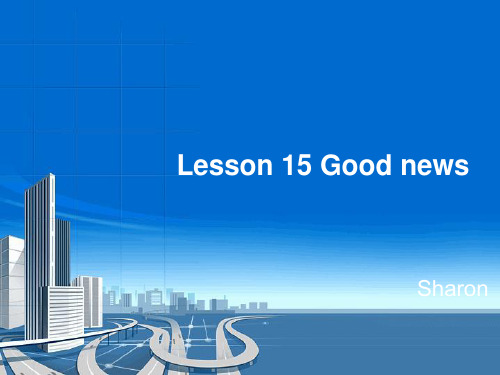
n. 秘书 adj. 精神紧张的 v. 负担得起 adj. 弱的 v. 插话;打断
Key words:
• secretary 秘书 • → the Foreign Secretary 外交部长
Key words:
• • • • • • • nervous adj. 精神紧张的 e.g.: I'm very nervous about taking this exam. 参加这次考试我非常紧张。 e.g.: I’m always nervous when I have to make a speech. 当我要做演讲时我总是很紧张。 → be nervous of 害怕……;对……胆怯 e.g.: Some people are nervous of walking in the dark. → feel nervous about (at) sth. 为某事儿忐忑不安 e.g.:I feel nervous about whether I can be admited to this university.
• Lesson 15 Grammar • 直接引语和间接引语
• Direct Speech and Indirect Speech
1.He said that business was very bad.
2.He told me that the firm could not afford to pay such large salaries. 3.He said: “ Don’t interrupt.” 4. He smiled and told me I would receive an extra thousand pounds a year!
Listen and fill in the blanks:
高级英语Lesson_15_No_Signposts_in_the_Sea..

Honour
Hawthornden Prize
霍桑登奖
• The Hawthornden Prize, the oldest of the famous British literary prizes, was founded in 1919 by Alice Warrender. • It is awarded annually to an English writer for the best work of imaginative literature. It is especially designed to encourage young authors.
•
The first week at sea give Carr special experiences: the release from pressure, the lackadaisical (懒洋洋的, 感伤的) rhythms of ship life, the shifting panorama of magnificent skies and sea, passing shores and the infrequent ports-of-call, as well as his growing knowledge of Laura. Exhilarated by the distant vista of exotic islands never to be visited and his conversations with Laura, Edmund finds himself rethinking all his values.
• Her works
• After their marriage, they traveled widely when he was in foreign office. • At first she played her role as a dutiful wife, but then her husband admitted that he had a male lover. The marriage endured despite their homosexual affairs, but Harold's affairs were less passionate than Vita's. • They had two children, the art critic Benedict Nicholson and the publisher Nigel Nicholson.
九年级英语下册Lesson15教材内容详解冀教版

Lesson 15Cloning Questions克隆问题◆课文英汉对照Hi, Jenny,你好,詹妮,How are you? Everyone here is fine. Wang Mei says hello to you. This week in school, we你好吗?这儿大家都好。
王梅向你问好。
这一周在学校里,我studied DNA. It was quite interesting! Scientists are doing so many new things with DNA.们学习了有关DNA的知识。
它很有趣!科学家们正在用DNA制造许多新的东西。
I think it will change the world. I don’t think the world will ever be the same again.我想DNA将改变世界。
我认为世界将不会再是一个样子了。
I didn’t know very much about cloning. I knew that English scientists had cloned a sheep,我不知道有关克隆的更多的知识。
我知道英国科学家已经克隆出了一只绵羊,but I knew neither how nor why. Our class discussed the future of cloning. Our teacher但我既不知道怎样克隆,也不知道为什么要克隆。
我们班讨论了有关克隆的未来。
asked us, “should scientists try to clone people?” some of my classmates thought it was a老师问我们,“科学家们应该尝试克隆人吗?”一部分同学认为那是一个好想法,good idea, but I don’t think so.但是我不这样认为。
新概念英语第一册Lesson15Yourpassport,please
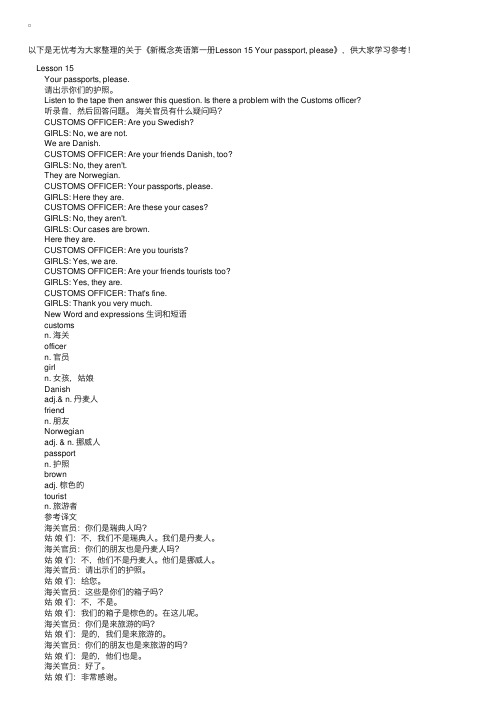
以下是⽆忧考为⼤家整理的关于《新概念英语第⼀册Lesson 15 Your passport, please》,供⼤家学习参考! Lesson 15 Your passports, please. 请出⽰你们的护照。
Listen to the tape then answer this question. Is there a problem with the Customs officer? 听录⾳,然后回答问题。
海关官员有什么疑问吗? CUSTOMS OFFICER: Are you Swedish? GIRLS: No, we are not. We are Danish. CUSTOMS OFFICER: Are your friends Danish, too? GIRLS: No, they aren't. They are Norwegian. CUSTOMS OFFICER: Your passports, please. GIRLS: Here they are. CUSTOMS OFFICER: Are these your cases? GIRLS: No, they aren't. GIRLS: Our cases are brown. Here they are. CUSTOMS OFFICER: Are you tourists? GIRLS: Yes, we are. CUSTOMS OFFICER: Are your friends tourists too? GIRLS: Yes, they are. CUSTOMS OFFICER: That's fine. GIRLS: Thank you very much. New Word and expressions ⽣词和短语 customs n. 海关 officer n. 官员 girl n. ⼥孩,姑娘 Danish adj.& n. 丹麦⼈ friend n. 朋友 Norwegian adj. & n. 挪威⼈ passport n. 护照 brown adj. 棕⾊的 tourist n. 旅游者 参考译⽂ 海关官员:你们是瑞典⼈吗? 姑娘们:不,我们不是瑞典⼈。
新概念英语第二册第15课课件

She is a nervous woman.
假设此处还有
一个 表情包
②紧张的,担心的,情绪不安的
他从来没有在公共场合发过言,所以他非常紧张。
He had never spoken in public, so he was very nervous.
假设此处真的
有一个 表情包
A. how many people have been out of hospital B. when is Thanksgiving C. which animal does he like best D. what time will the dolphin show start
5. ---Can I help you?
He said “I lost my keys” He said he had lost his keys.
Mary told me “I have been waiting for an hour.” Mary told me that she had been waiting for an hour.
secret
['siːkrɪt] n. 秘密
替某人保守秘密 keep secret for sb.
请替我保守秘密!
Please keep secret for me!
in secret 秘密地
假设此处有一个 表情包
假设此处又有
一个 表情包
nervous
['nɜːvəs]
①adj. 神经质的,神经紧张的
disturb v. 打扰某人
02.
Game Time
03.
Grammar
直接引语: “”引号里的原话。
典范英语第十五课

典范英语第十五课Education is a fundamental aspect of human development, shaping individuals and societies alike. Within the realm of education, the English language holds a prominent position, serving as a global means of communication and a gateway to a wealth of knowledge. In this essay, we will explore the exemplary nature of the fifteenth lesson in the English curriculum, delving into its significance and the insights it offers.The fifteenth lesson in the English curriculum is a testament to the depth and nuance of the language. It encompasses a range of linguistic concepts, from grammar and syntax to vocabulary and rhetoric. Through this lesson, students are exposed to the intricate structures and conventions that underpin effective communication, empowering them to express themselves with clarity, precision, and eloquence.One of the standout features of this lesson is its emphasis on grammatical structures. Students are introduced to advanced grammatical principles, such as complex sentence structures, verbtenses, and the use of modifiers. By mastering these elements, learners develop a deeper understanding of the mechanics of the English language, enabling them to construct more sophisticated and engaging written and oral expressions.Moreover, the fifteenth lesson delves into the expansive realm of vocabulary. Students are challenged to expand their lexical repertoire, exploring the shades of meaning that different words can convey. This not only enhances their ability to articulate their thoughts and ideas but also fosters a greater appreciation for the richness and versatility of the English language.Alongside the technical aspects of language, the fifteenth lesson also addresses the art of rhetoric. Students are encouraged to explore the art of persuasion, learning how to craft compelling arguments, employ rhetorical devices, and tailor their communication to different audiences and contexts. This skill set is invaluable in a world where effective communication is a crucial tool for personal and professional success.One of the most remarkable aspects of this lesson is its emphasis on critical thinking. Rather than simply imparting knowledge, the fifteenth lesson prompts students to engage in deep analysis, to question assumptions, and to develop their own unique perspectives. This approach cultivates a sense of intellectual curiosity andanalytical prowess, preparing learners to navigate the complexities of the modern world.Furthermore, the fifteenth lesson often incorporates the study of literature, exposing students to the rich tapestry of written works that have shaped the English language and its cultural heritage. By engaging with literary masterpieces, learners gain a deeper understanding of the nuances of language, the power of storytelling, and the universal themes that transcend time and place.Beyond the academic realm, the lessons imparted in the fifteenth lesson have far-reaching implications for personal growth and development. The skills acquired, such as effective communication, critical thinking, and the appreciation of language, are invaluable in all aspects of life. They empower individuals to navigate social interactions, professional endeavors, and personal relationships with greater confidence and finesse.Moreover, the exemplary nature of this lesson extends beyond the individual, as it contributes to the broader societal impact of language education. By equipping students with a strong command of the English language, the fifteenth lesson prepares them to engage with the global community, to participate in cross-cultural dialogue, and to contribute to the advancement of knowledge and understanding.In conclusion, the fifteenth lesson in the English curriculum is a shining example of the transformative power of language education. Through its comprehensive approach to linguistic concepts, its emphasis on critical thinking, and its exploration of literature and cultural heritage, this lesson empowers learners to become articulate, adaptable, and intellectually curious individuals. As we continue to navigate the ever-evolving landscape of communication and global interconnectedness, the lessons imparted in this exemplary curriculum will undoubtedly continue to shape the leaders, thinkers, and change-makers of tomorrow.。
八年级英语下册Lesson15教材内容详解冀教版
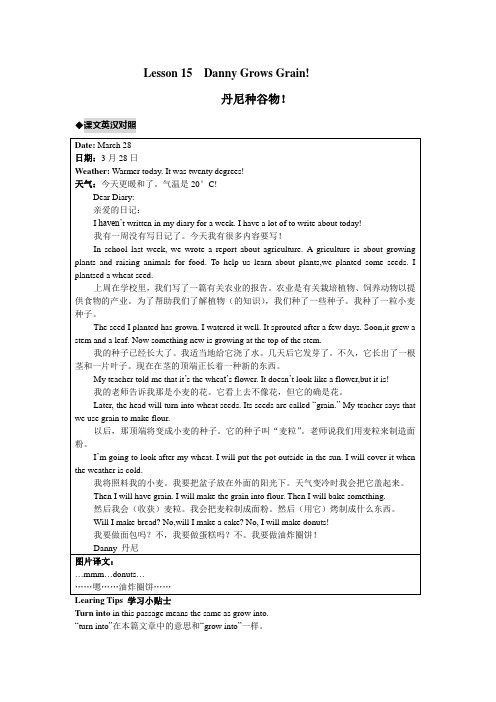
Lesson 15 Danny Grows Grain!丹尼种谷物!Learing Tips 学习小贴士T urn into in this passage means the same as grow into.“turn into”在本篇文章中的意思和“grow into”一样。
LET’S DO IT! 做一做!●Play a game! “Word Race” is a competition between two groups. Which group can name more plants in Engelish? Which group can do it faster? Write the plant names on the blackboard one by one.做游戏!“单词比赛”是两个组之间的比赛。
(看)哪个小组能用英语说出更多的植物名称?哪个小组做得更快?把植物的名称一个接一个地写在黑板上。
◆重点难点详解1.I haven’t written in my diary for a week. 我有一个星期没写日记了。
⑴该句用了现在完成时的否定形式,现在完成时态的结构是have/ has +过去分词。
现在完成时态表示在说话之前已经完成或结束的动作;它强调过去的动作对现在造成的影响及结果。
它不能与表示过去的时间状语连用。
●—I’ve read the newspaper today. 我今天看过报纸了。
●—I haven’t seen him for long. 我好久没看见他了。
⑵现在完成时也可以表示某一动作从过去开始一直持续到现在的情况,常与for,since等短语连用,此种用法中的动词须是延续性的动词。
在此用法中,短暂性动词可用于否定句中。
●—He has learned English for 3 years. 他已学了三年英语。
●—We have known each other for over 10 years. 我们彼此认识十多年了。
高级英语Lesson15NoSignpostsintheSea课后练习及答案
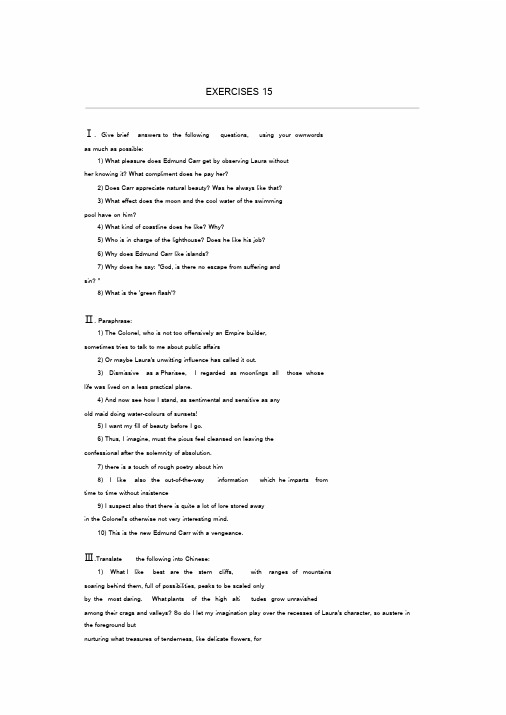
EXERCISES 15Ⅰ. Give brief answers to the following questions, using your ownwordsas much as possible:1) What pleasure does Edmund Carr get by observing Laura withouther knowing it? What compliment does he pay her?2) Does Carr appreciate natural beauty? Was he always like that?3) What effect does the moon and the cool water of the swimmingpool have on him?4) What kind of coastline does he like? Why?5) Who is in charge of the lighthouse? Does he like his job?6) Why does Edmund Carr like islands?7) Why does he say: "God, is there no escape from suffering andsin? "8) What is the 'green flash'?Ⅱ. Paraphrase:1) The Colonel, who is not too offensively an Empire builder,sometimes tries to talk to me about public affairs2) Or maybe Laura's unwitting influence has called it out.3) Dismissive as a Pharisee, I regarded as moonlings all those whoselife was lived on a less practical plane.4) And now see how I stand, as sentimental and sensitive as anyold maid doing water-colours of sunsets!5) I want my fill of beauty before I go.6) Thus, I imagine, must the pious feel cleansed on leaving theconfessional after the solemnity of absolution.7) there is a touch of rough poetry about him8) I like also the out-of-the-way information which he imparts fromtime to time without insistence9) I suspect also that there is quite a lot of lore stored awayin the Colonel's otherwise not very interesting mind.10) This is the new Edmund Carr with a vengeance.Ⅲ.Translate the following into Chinese:1) What I like best are the stern cliffs, with ranges of mountainssoaring behind them, full of possibilities, peaks to be scaled onlyby the most daring. What plants of the high alti tudes grow unravishedamong their crags and valleys? So do I let my imagination play over the recesses of Laura's character, so austere in the foreground butnurturing what treasures of tenderness, like delicate flowers, forthe discovery of the venturesome.2) In all this serenity of ocean it is seldom that we espy so muchas another ship; the jolly dolphins and the scratchy littleflying-fish have the vast circle all to themselves, 'the Flying Fish,who has a part with the birds, ' and doubtless are glad to see thelast of the monster which bears us into and out of sight. Our wakecloses up and we might never have been. But it does happen from timeto time that an island appears on the horizon, nameless to us and fullof mystery, the peak of a submarine mountain range , lonely,unblemished, re mote. Does one like islands because one unconsciously appropriates them, a small manageable domain in a large unmanageable world? I cannot tell why it should give me suck a queer sensation toreflect that that island has always been there (unless indeed it beno more than the work of the patient coral) and will be there still, should I return to find it waiting for me.IV. Look up the dictionary for the following loan words. Try to findout from what languages they are borrowed and then put them intoChinese.Model: creme de menthe-- ( 法) 薄荷酒1) ad hoe 2) blitzkrieg3) skoal 4) charg6 d'affairs5) concerto 6) coup d'dtat7) d6eor 8) detente9) hors d oeurves 10) intermezzo11) kimono 12) kowtow13) kulak 14) macho15) smorgasbord 16) status quo17) fiesta 18) rajah19) emir 20)eurekaⅤ.Make sentences with the following words using the parts of speech indicated in the brackets:1) fill (v. n. ) 6) range (n. v. )2) ripple (n. v. ) 7) beach (n. v. )3) marble (n. v. ) 8) catch (v. n. )4 ) pile (n. v. ) 9) hump (n. v. )5) touch (v. n. ) 10) obscure (adj. v. )Ⅵ.pick out from the text all the words and phrases describing colours.Ⅶ.Replace t he italicized words with simple, everyday words or expressions"1) and thus beguile ourselves for an hour or so after dinner ( )2) prefacing his remarks by 'Of course it's not for me to suggestto you' ( )3) I regarded as moonlings all those whose life was lived on a less practical plane. ( )4) I once flattered myself that I was an adult man. ( )5) or a low-lying arid stretch with miles of white sandy beach ( )6) So do I let my imagination play over the recesses of Laura ’s character, so austere in the foreground ( )7) Darkness falls, and there is nothing but the intermittent gleam of a lighthouse on a solitary promontory. ( )8) which he imparts from time to time without insistence ( )9) and it is not a sensation I could expect anyone save Laura to understand ( )10) Wegazed, as the ship slid by and the humpsreceded into darkness and even the lights were obscured by the shoulder of a hill ( ) ( )11) ‘Vicious viridian ’I say, not to be outdone. ( )12) I would never have believed in the simplde bliss of being, day after day, at sea. ( )Ⅷ. Replace the italicized words or phrases with specific words that appear in the text:1) The teacher tends to fill us with too many facts. ( )2) As the policemen approached on horseback, the demonstrators went away quickly in different directions. ( )3) The thief moved stealthily along the corridor. ( )4) The detective inspected the room and wrote something hastilyin his notebook. ( )5) Prices went up rapidly when the war broke out. ( )6) There is more and more work for me. ( )7.)Some idlers were standing about in a lazy way at the streetcorner. ( )8) After the tide went back, the kids began to pick shells on theshore. ( )9) On hearing the shot, he quickly put out his hand and took thegun lying on the table. ( )10) She struck him on the face with the palm of her hand. ( )Ⅸ.Point out the metaphors, similes and alliterations used in the text.Ⅹ.Point out the figures of speech used in the following sentences:1) in the evening she wears soft rich colours ( )2) he says he used to read me ( )3) I want my fill of beauty before I go. ( )4) The young moon lies on her back tonight as is her habit in thetropics, and as, I think, is suitable if not seemly for a virgin. ( )5) and the cool support of the water ( )6) I wondered what mortal controlled it, in what must be one ofthe loneliest, most forbidding spots on earth. ( )7) and the sky a tender palette of pink and blue ( )8) I had no temptation to take a flying holiday to the South ( )9) And then I like all the small noises of a ship: the faintcreaking, as of the saddle-leather to a horseman riding across turf,the slap of a rope, the hiss of sudden spray. ( )10) but above all I love these long purposeless days in which Ished all that I have ever been. ( )Ⅺ. Choose the right word from the list given below for each blank.Pay attention to the correct combinations of adverbs and adjectives.disappointed simple beautifulconscious close highobvious inadequate beatenignorant impartial confidentinterested clear jealousexaggerated1) A referee should always try to be strictly __2) The answer is laughably __ when you think it over.3) The rate of income-tax in this country is astronomically4) He was insanely __ of his brother's success. 5) The childrenplayed on, blissfully __ of their parents' death. 6) Our host madeit painfully __ that we should leave.7) The casualties in the war have been grossly __8) The team played badly and were soundly __9) It was abundantly __ to everyone that he had something on hismind.10) Just before the exam, he appeared to be supremely __ of Success.11) He was bitterly __ when he heard the result.12)The roads are woefully __ and simply can ’t meet today ’s requirements?13)The bullet passed uncomfortably __ to his head.14)Jim is keenly__ in collecting stamp 。
剑桥雅思15听力原题
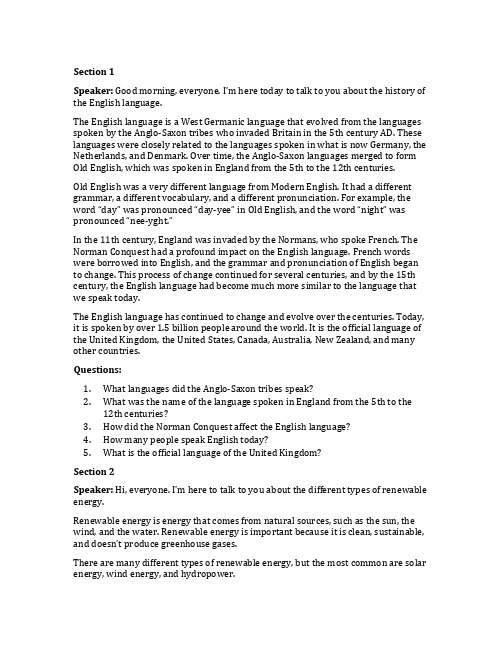
Section 1Speaker:Good morning, everyone. I’m here today to talk to you about the history of the English language.The English language is a West Germanic language that evolved from the languages spoken by the Anglo-Saxon tribes who invaded Britain in the 5th century AD. These languages were closely related to the languages spoken in what is now Germany, the Netherlands, and Denmark. Over time, the Anglo-Saxon languages merged to form Old English, which was spoken in England from the 5th to the 12th centuries.Old English was a very different language from Modern English. It had a different grammar, a different vocabulary, and a different pronunciation. For example, the word “day” was pronounced “day-yee” in Old English, and the word “night” was pronounced “nee-yght.”In the 11th century, England was invaded by the Normans, who spoke French. The Norman Conquest had a profound impact on the English language. French words were borrowed into English, and the grammar and pronunciation of English began to change. This process of change continued for several centuries, and by the 15th century, the English language had become much more similar to the language that we speak today.The English language has continued to change and evolve over the centuries. Today, it is spoken by over 1.5 billion people around the world. It is the official language of the United Kingdom, the United States, Canada, Australia, New Zealand, and many other countries.Questions:1.What languages did the Anglo-Saxon tribes speak?2.What was the name of the language spoken in England from the 5th to the12th centuries?3.How did the Norman Conquest affect the English language?4.How many people speak English today?5.What is the official language of the United Kingdom?Section 2Speaker:Hi, everyone. I’m here to talk to you about the different types of renewable energy.Renewable energy is energy that comes from natural sources, such as the sun, the wind, and the water. Renewable energy is important because it is clean, sustainable, and doesn’t produce greenhouse gases.There are many different types of renewable energy, but the most common are solar energy, wind energy, and hydropower.Solar energy is the energy that comes from the sun. Solar energy can be used to generate electricity or heat water. Wind energy is the energy that comes from the wind. Wind turbines can be used to generate electricity. Hydropower is the energy that comes from flowing water. Hydroelectric dams can be used to generate electricity.Renewable energy is becoming increasingly popular around the world. This is because renewable energy is clean, sustainable, and doesn’t produce greenhouse gases.Questions:1.What is renewable energy?2.Why is renewable energy important?3.What are the most common types of renewable energy?4.How is solar energy used?5.How is wind energy used?Section 3Speaker:Good afternoon, everyone. I’m here to talk to you about the i mportance of recycling.Recycling is the process of converting waste materials into new materials and objects. Recycling is important because it helps to conserve natural resources, reduce pollution, and save energy.There are many different materials that can be recycled, including paper, plastic, glass, and metal. Recycling these materials helps to reduce the amount of waste that goes to landfills and incinerators.Recycling also helps to conserve natural resources. For example, recycling paper helps to save trees. Recycling plastic helps to conserve oil. And recycling metal helps to conserve minerals.Recycling also helps to save energy. For example, recycling aluminum cans saves 95% of the energy that would be required to produce new aluminum cans from raw materials.Recycling is a simple way to make a big difference to the environment. By recycling, we can help to conserve natural resources, reduce pollution, and save energy. Questions:1.What is recycling?2.Why is recycling important?3.What materials can be recycled?4.How does recycling help to conserve natural resources?5.How does recycling help to save energy?Section 4Speaker:Hello, everyone. I’m here to talk to you about the different types of museums.There are many different types of museums, each with its own unique collection of artifacts and exhibits. Some of the most popular types of museums include art museums, history museums, science museums, and natural history museums.Art museums display works of art, such as paintings, sculptures, and drawings. History museums tell the story of human history, from the earliest civilizations to the present day. Science museums explain the natural world, from the smallest atoms to the largest galaxies. And natural history museums display specimens of plants, animals, and minerals.Museums are important because they help us to learn about the world around us. They can also be a great source of entertainment and inspiration.Questions:1.What are some of the most popular types of museums?2.What do art museums display?3.What do history museums tell the story of?4.What do science museums explain?5.What do natural history museums display?。
新概念英语青少版2A Unit 15 It's a mystery to me!

It was OK. But it was all about babies and food!
Babies? How many babies?
Two. Marcel's deputy had a baby two months ago. And Pierre's secretary is going to have a baby in June.
Questions:
NYoien,steh,tmehyeoydnotdhnos'.t.. They have nine months off work each time.
Questions:
YNTMheosra,ehi,rthiectweeihdslad.oi.sdiudnnr.''stt.. HItewhaasdaluthnrcehe-whitohurMlaurnccehl.
trip
serious
baby
mystery
off
understand attitude
civilised
welcome
happen
efficient business
nap 外出一天
游戏
holiday 打盹
ride game
instead a day out
Welcome home, Jack! Did you have a good trip?
And then there's the food. I had lunch with Marcel. I didn't want a three-hour lunch, but lunch is a serious business in Paris.
- 1、下载文档前请自行甄别文档内容的完整性,平台不提供额外的编辑、内容补充、找答案等附加服务。
- 2、"仅部分预览"的文档,不可在线预览部分如存在完整性等问题,可反馈申请退款(可完整预览的文档不适用该条件!)。
- 3、如文档侵犯您的权益,请联系客服反馈,我们会尽快为您处理(人工客服工作时间:9:00-18:30)。
会话A : 在娱乐公园
马 丁:下午好!你们好吗??
众 :很好,谢谢。不错。下午好。你好,你怎么样?非常好。?
马 丁:幸会。感谢你们今天下午能来。告诉我你们的工作。从你开始吧!你是哪位??
RALPH: I like horses, too.?
KRISTIE: When do you work??
RALPH: I work on Monday, Wednesday and Saturday. I don't work on Sunday, Tuesday, Thursday or Friday.?
MARTIN: Ralph, you work in a restaurant now. What did you do last year??RALPH: I worked in a music store.?
MARTIN: When did you work??
RALPH: I only worked on Saturday.?
会话B
?
拉 尔 夫:克里斯蒂,你在哪上学??
克里斯蒂:我在圣玛丽中学上学。?
马 丁:你多大了??
MARTIN: Thanks. Don, what do you do??
DON: I'm a lifeguard.?
MARTIN: You're a swimmer??
DON: Yes, I'm a good swimmer.?
MARTIN: Wonderful! When do you work??
CELIA: I'm Celia Chan.?
MARTIN: Where do you live??
CELIA: I live at 12 Coolidge Street.?
MARTIN: What do you do??
CELIA: I'm a sales person. I sell things.?
MARTIN: Ralph, where do you go to school??
RALPH: At Central High School.?
MARTIN: Celia, where do you go to high school??
CELIA: I go to school at South High School.?
MARTIN: That's a lot.?
KRISTIE?
Practice 1:询问对方的工作时间时可用:
When do you work? 你何时工作?
回答时可用 I work+时间短语。
Examples: MARTIN: When do you work??
RALPH: I'm Ralph Beck.?
MARTIN: How old are you, Ralph??
RALPH: I'm sixteen years old.?
MARTIN: Celia, how old are you??
CELIA: I'm sixteen.?
MARTIN: Ralph, where do you work??
MARTIN: Don. You're a lifeguard now. Where did you work last year??
DON: I worked at a supermarket.?
MARTIN: When did you work??
DON: I only worked on Sunday.?
CELIA: Oh, I love horses!?
KRISTIE: Do you work on Monday??
CELIA: No, I don't work on Monday. I work on Friday, Saturday and Sunday.?KRISTIE: Come see me on Monday.?
KRISTIE: Yes, I only like horses. Come see the horses now!?
CAST: Can we? Great idea! Wonderful! Why not? Let's go.?
MARTIN: Kristie, you work at the stable now. What did you do last year??KRISTIE: I didn't work last year.?
MARTIN: What do you do at the stable??
KRISTIE: I exercise the horses.?
MARTIN: Do you like animals??
KRISTIE: No, I don't.?
MARTIN: Do you like horses??
马 丁:那么,你是哪位??
拉 尔 夫:我叫拉尔夫·贝克。?
马 丁:你多大了?拉尔夫。?
拉 尔 夫:我16了。?
马 丁:西莉亚,你多大??
西 莉 亚:我16。?
马 丁:拉尔夫,你在哪儿工作??
拉 尔 夫:我在边塞餐馆工作。?
马 丁:你做什么工作??
拉 尔 夫:服务员。?
DON: I live at six twenty-eight Monroe Street.?
MARTIN: How old are you??
DON: I'm seventeen years old.?
MARTIN: Where do you go to school??
DON: I go to school at Northwest High School.?
MARTIN: Who are you??
KRISTIE: I'm Kristie Wasserman.?
MARTIN: When do you work??
KRISTIE: I work everyday-Monday, Tuesday, Wednesday, Thursday, Friday, Saturday and Sunday.?
DON: I work on Sunday, Tuesday and Thursday. I work at a supermarket on Saturday.?
MARTIN: What do you do at the supermarket??
DON: I'm a stock boy. I put things on the shelves.?
MARTIN: Celia, what did you do last year??
CELIA: I was a salesperson. I worked at the General Store.?
MARTIN: When did you work??
CELIA: I worked on Friday and Monday.?
MARTIN: Celia, when do you work??
CELIA: I work on Friday, Saturday and Sunday.?
MARTIN: Thanks. And who are you??
DON: I'm Don Tharp.?
MARTIN: Where do you live??
马 丁:你多大了??
唐 :我17岁。?
马 丁:你在哪儿上学??
唐 :在西北高中。?
马 丁:拉尔夫,你在哪儿上学??
拉 尔 夫:在中央高中。?
马 丁:西莉亚,你在哪所高中上学呢??
西 莉 亚:在南方高中。?
马 丁:谢谢。唐,你做什么工作呢??
马 丁:你在什么时候工作??
拉 尔 夫:我星期一、星期三和星期六工作。?
马 丁:西莉亚,你什么时候工作??
西 莉 亚:我在星期五、星期六和星期日工作。?
马 丁:谢谢。你是哪位??
唐 :我叫唐·撒普。?
马 丁:你住哪儿??
唐 :我住门罗街628号。?
RALPH: I work on Monday, Wednesday and Saturday.?
MARTIN: When do you work??
CELIA: I work on Friday, Saturday and Sunday.?
MARTIN: When do you work??
马 丁:你是哪位??
克里斯蒂:我叫克里斯蒂·瓦瑟门。?
马 丁:你什么时候工作??
克里斯蒂:我每天都工作,星期一、二、三、四、五、六、日。?
马 丁:太辛苦了。?
克里斯蒂:我每天只工作两小时。?
Conversation B
RALPH: Kristie, where do you go to school??
KRISTIE: Come see me on Tuesday. When do you work, Don??
DON: I don't work on Monday, Wednesday or Friday.?
KRISTIE: I work everyday. Come see me on Wednesday.?
唐 :我是救生员。?
马 丁:你会游泳吧??
